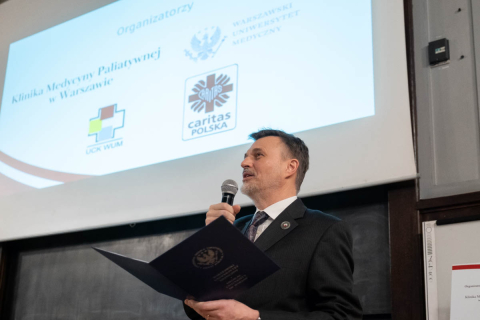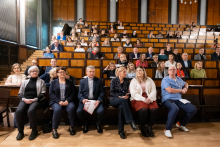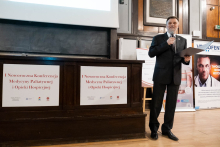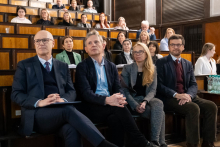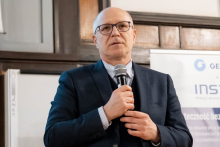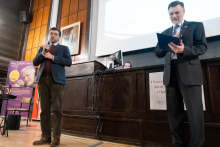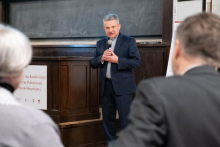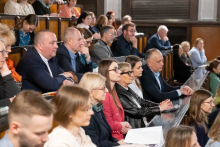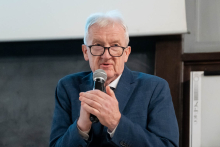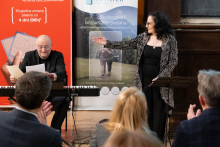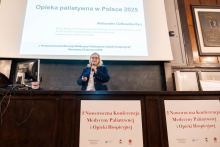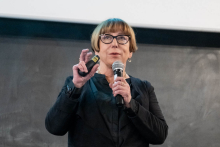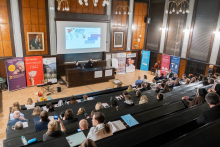The 1st New Year's Conference on Palliative Medicine and Hospice Care was held on January 23. The guests were welcomed by Tomasz Dzierżanowski, MD, PhD, Head of the Department of Palliative Medicine MUW, and then Prof. Rafał Krenke, Rector of MUW, Prof. Paweł Włodarski, Dean of the Faculty of Medicine, and Rev. Janusz Mejda, Director of Caritas Poland, took the floor to emphasized the importance of the fact that this type of unit functions within the university.
After welcoming the guests, soprano Agnieszka Gertner-Polak, accompanied by jazz pianist Bogdan Hołownia, gave a recital of Christmas carols and pastorals. The performance was conducted by Grzegorz Polak, co-author and editor of ecumenical and hagiographic books.
Palliative treatment and care - current situation, principles and activities
The lecture part addressed various issues related to palliative medicine. Aleksandra Ciałkowska-Rysz, MD, PhD, Professor of the Medical University of Lodz, Head of the Department of Palliative Medicine at the Medical University of Lodz, a long-time national consultant in this field, presented the current situation of palliative care in Poland, including legal changes and new requirements of the National Health Fund. Then Dr. Elwira Góraj, provincial consultant in palliative medicine, spoke about current principles of pain treatment. The speaker emphasized that in Poland, the principles of proper treatment of chronic pain are still not universally applied. Despite the current Article 20a of the Law on Patient Rights and Patient Ombudsman, which states that the provider of health care services is obliged to take measures to determine the severity of pain, treat pain and monitor the effectiveness of this treatment. Prof. Tomasz Pasierski, a cardiologist and Head of the Study of Medical Ethics and History of Medicine, presented the principles of palliative care for cardiac patients.
This academic year at the Student Research Circle MedPal, which operates at the department, the student volunteer program was launched. Piotr Dudek, a 6th year MUW medical student and coordinator of this volunteering program, talked about his own experience with voluntary and unpaid work for the benefit of patients. He stressed that volunteering gives access to unique contact with patients and the deep emotions associated with it. A student-volunteer can become one of the links in the family-patient-medical staff chain and support patients with problems they don't want to share with their families, and, on the other hand, support patients in contact with the doctor, for example, if they need to discuss the treatment process.
Dr. Aleksandra Zagajewska and Dr. Natalia Staruszkiewicz from the circle at the Department of Palliative Medicine MUW touched on the subject of artificial hydration of patients in the last days of life. The speakers discussed the pros and cons of this practice, stressing that it should not be started routinely, and that all decisions related to this method should be made carefully and tailored to the individual needs of the patient.
“The first year behind us” - On the role of palliative medicine clinics in patient care
Finally, Tomasz Dzierżanowski, MD, PhD, Head of the Department of Palliative Medicine MUW, and medical director of Caritas of the Warsaw-Praga Diocese, vice president of the Polish Society of Palliative Medicine, chairman of the Hospice Council of Caritas Poland, gave a lecture summarizing the year of existence of the unit he runs.The Department of Palliative Medicine MUW, located at the Infant Jesus Clinical Hospital UCC MUW on Lindleya Street, began its operation in December 2023. It is the first department in the capital providing inpatient 24-hour palliative care services for patients suffering from, among others: cancer, end-stage forms of certain neurological diseases, end-stage chronic respiratory failure or AIDS. Patients are cared for by qualified and compassionate staff.
- Our department treats patients with incurable progressive disease, most often cancer, improving their quality of life through prevention, early diagnosis as well as effective relief of pain and other symptoms and problems in the physical, mental, social and spiritual areas. As a university unit, it conducts research by collaborating with other universities in Poland and around the world. Training the staff, primarily medical students and palliative medicine specialists is also crucial. This is how it differs from inpatient hospices, whose task is primarily to provide health services - says Tomasz Dzierżanowski, MD, PhD.
However, Dzierżanowski, MD, PhD, stresses that this is not the only difference. The department is a reference unit and is supposed to support hospices in the Mazovian province in implementing up-to-date knowledge, integrating the community and facilitating staff access to training and knowledge sources.
- Hence the idea for the 1st New Year's Conference on Palliative Medicine and Hospice Care for the Mazovian palliative medicine community and the hospice movement was born. This is an opportunity not only to listen to lectures, but also to experience the spirit of Christmas together, meet, get to know colleagues from the community, sing a carol together, share a good word and a moment of reflection and gratitude - explains Tomasz Dzierżanowski, MD, PhD.
With carols and pastorals, but already sung together, the conference ended.
Among the guests at the event, and there were nearly 100 of them, were also Prof. Agnieszka Cudnoch-Jędrzejewska, Vice Rector for Clinical Affairs and Investments MUW, and Rev. Prof. Piotr Aszyk, Rector of Collegium Bobolanum.
